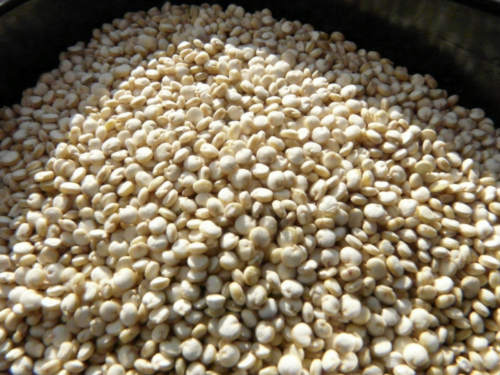Image courtesy of Creative Commons.
When you’re stressed during an exam or trying to recall a memorized speech under duress, it might feel like your memories are escaping you. The chaos stress brings can dominate your mind. When under stress, the structure and functionality of the brain, particularly in areas responsible for memory such as the hippocampus, are dramatically impaired, negatively impacting recall. Surprisingly, quinoa may be an answer to this problem. Quinoa is a pseudocereal from the Andean region in South America whose seeds have exceptional nutritional value, including high levels of unsaturated fatty acids, antioxidants, and an extraordinary balance of essential amino acids. Thus, incorporating quinoa into one’s diet may not only be a flavorful addition but also an asset in de-clouding stress-induced memory challenges.
But what specifically about quinoa gives it its neuroprotective abilities? “Previous research has shown that under treatments that trigger oxidative stress in the brain, some quinoa seed extracts could protect against damage in the brain, demonstrating quinoa’s neuroprotective properties that owe to the high levels of phenolic compounds acting as antioxidants,” explained Pablo Muñoz-Llancao, a Yale post-doctoral researcher in the Ferguson lab. Since quinoa is rich in these antioxidant phenolic compounds (natural chemicals found primarily in plants), the researchers began to wonder: Could quinoa preserve one’s memory under stress?
In a recently published study conducted by Muñoz-Llancao and his colleagues from universities in Chile, stressed and non-stressed rats were separated into two groups, with each group receiving either normal food or a 50/50 mix of quinoa-based food and normal food for one month. While stressed rats were physically restrained, non-stressed rats were free to roam during the experiment. To test the effects of the different diets, the researchers performed memory exercises with each group to evaluate the behavior of the stressed specimens—specifically, they wanted to know if quinoa positively impacted memory retrieval functionality, using non-stressed rats as the control group. These memory exercises consisted of Y-mazes, where the scientists observed if the animals could remember which path led to a reward. There ended up being a statistically significant difference in performance on these memory exercises between stressed rats that had quinoa in their diets versus those that did not. Not only was the consumption of quinoa associated with better performance on memory exercises, but hippocampus imaging also displayed a clear reduction in the deterioration of neurons responsible for memory. These results further supported the hypothesis that quinoa plays a key role in protecting memory functions in the brain.
What does this mean for the future of quinoa? “Future research should investigate whether quinoa’s effects on behavior are primarily due to the content of unsaturated fatty acids, such as oleic, linoleic, and alpha-linolenic, or other nutrients found in various quinoa seeds,” Muñoz-Llancao said. The study also opens up possible areas of research for other pseudocereals such as amaranth and buckwheat, which may contain beneficial compounds similar to the ones present in quinoa. Moreover, understanding the molecular mechanisms underlying quinoa’s impact on stress resilience could pave the way for targeted interventions or dietary recommendations that optimize memory functionality in individuals facing chronic stress. “I believe that incorporating pseudocereals into a balanced diet and combining it with regular exercise could have a therapeutic effect in coping with the stresses of modern life,” Muñoz-Llancao said.

